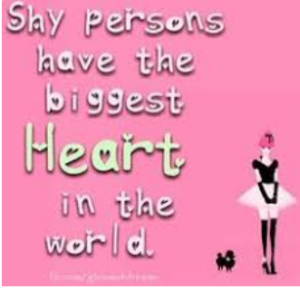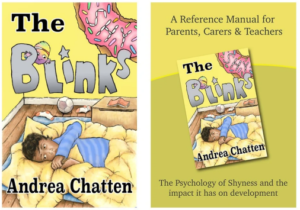10 May May 2021 Newsletter

Hello,
Thank you to all of who kindly took the time to email me since the last newsletter saying how helpful it was and to the support we have received about our Healthy minds, happy kids manual. It means so much to me to hear you sharing your support of The Blinks philosophy and how they are helping you and your children nudge emotional wellbeing in the right direction.
As followers, I promised I would share some insight on the psychology of shyness in this newsletter, so I had better get on with it!
Shyness is an emotional state which combines a behavioural reserve and elements of anxiety when faced with social situations. It is normal for all children to experience it sometimes as part of learning about life and growing up. Toddlers up to roughly two years old are mostly impulsive, curious and embrace social situations with ease. Between the ages of two and four, a second stage of stranger anxiety emerges and it is during these ages that our support is crucial in order for them to move through it and not become emotionally stuck.
Even as adults, most of us feel shy at times but as we have aged, we have learned the skills needed to manage or mask it. For some children and young people, shyness presents as severe fear and distress to such an extreme that their lives become hugely restricted because of it.

The Blinks Shy novel and manual helps us understand and validate this emotional state with incorporated strategies and action. You can have a look here to see if they might be of help to you and the young people in your life:
Shy Novel – Book2Look link
https://www.book2look.com/book/xGb5IPIEVC
Shy Manual – Book2 Link
https://www.book2look.com/book/QCWLgYmcdT

Top tips for supporting a child or young person with shyness:
- Teach social skills from as young as possible. Join playgroups, have play days with others. This early positive interaction will put your child at a huge advantage
- Challenge people’s negative perceptions of your child’s shyness. If they use the word shyness as a criticism, correct them using more appropriate and positive language like quiet, reserved or sensitive
- Role model confident social behaviour. If you are shy too, begin with small steps like being assertive in restaurants, simply holding a door open or smiling and saying hello to people as you pass them in the park
- Practise new situations before they happen so children have a better idea of what is to come and can even have a script planned if needed
- Give children plenty of time to get their head round potential new situations by offering lots of reassurance and supportive information to help them feel prepared
June’s newsletter is going to be all things love so don’t miss it.
Will be in touch again soon!
This download comes from Andrea Chatten and Unravel, a team of specialised Emotional and Behavioural Psychologists and Practitioners who provide bespoke support for children, young people, families and professionals.
Click here to visit our website and find out more about how Unravel can help.
We’d love for you to become part of the Unravel community on Facebook and join hundreds of others, actively engaged in supporting the emotional wellbeing of children and young people. Just click the button below…
Thanks so much for your interest. I look forward to being in touch with you.
Take Care
Andrea
Andrea Chatten
Founder – Unravel
Children’s Emotional & Behavioural Psychologist
unravelsupport.co.uk



